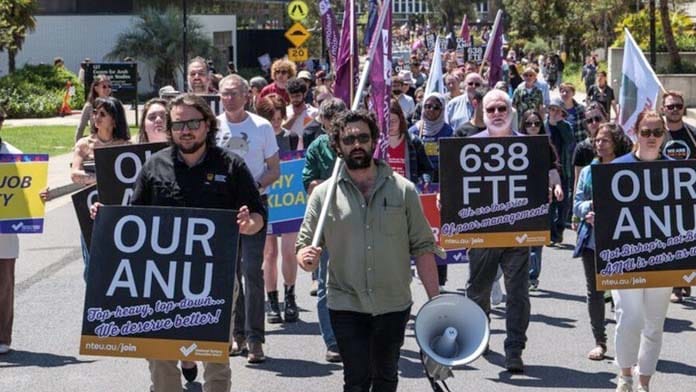Over 400 staff and students attended a rally on 16 October at ANU in defense of jobs and pay, marching to the Chancelry building and office of the Vice-Chancellor.
ANU has announced sweeping restructures and job cuts in response to what it says are large expected deficits. It aims to make cuts of $250 million by 2026, $100 million of it in cuts to staff jobs and salaries.
The NTEU estimates a total of 638 full-time equivalent jobs are threatened, with 137 jobs cuts announced so far.
Cuts are looming across the sector, triggered by the Labor government’s introduction of caps on the number of international students who can enrol in Australian universities. On 21 October the University of Canberra (UC) also announced plans to cut 200 jobs.
International student fees have become a major revenue source for universities following the decline in direct government funding.
With the ANU already running deficits, the less of income due to the caps have pushed it over the edge.
The restructure will see the College of Health and Medicine abolished, cutting 50 administrative staff and amalgamating it into the College of Science. Additionally, the Fenner School of Environment is being moved to the newly named college of “Systems and Society” which includes cybernetics, engineering and computer science and will house the new ANU Nuclear Systems engineering major created for AUKUS.
Staff at the ANU have been making more money for the university than ever before, with the financial problems a result of ANU management’s own decisions.
In recent years, ANU has pursued a vision of being a small elite university, using insidious slogans like “Teach less, better” to justify restructures and degree cuts to the College of Arts and Social Sciences in 2022. The same language has been utilised by new Vice-Chancellor Genevieve Bell claiming, “We will do less, but we will do it better”. But these cuts will dramatically decrease students’ quality of education and staff teaching conditions, just as they did in 2022.
Pay cuts
Staff at the protest agreed to vote no on the VC’s proposal for staff to forego this year’s 2.6 per cent pay rise staff won in enterprise bargaining.
The NTEU has rejected the pay cut, pointing to ANU’s previous use of the same strategy. In 2020 during COVID-19 staff agreed to forego a pay rise, and ANU repaid staff by cutting over 400 jobs, one of the largest proportions of staff cut by any university during the pandemic by size of institution.
The NTEU estimated 10 per cent of the ANU workforce was lost. Its aim of saving $100 million in staff costs by 2026 equates to cutting over 12 per cent of the ANU workforce today.
VC Genevieve Bell has claimed she is “doing her part” by taking a 10 per cent pay cut herself. But she will still earn over $1 million a year.
ANU also just spent $200 million on a physics building that will, in part, house the new AUKUS-aligned Nuclear Systems major, and has just announced the creation of a new Defence Institute. It also has over $1 million of investments in companies complicit in Israel’s genocide.
A union fightback is needed to save jobs. Staff and students elsewhere have succeeded in stopping job cuts. In 2012 when the University of Sydney announced 340 job cuts, thousands protested and students went on strike and launched occupations, saving half the academic jobs. In 2016 a 65-day occupation saved half of the jobs and several studios threatened by the closure of Sydney College of the Arts.
And while staff at the ANU failed to fight in 2021, many lessons have been learnt from that experience. Rank-and-file ANU staff need to push for a stronger fightback against the cuts and make it clear that they won’t be forced to bear the brunt of the mismanagement of the higher education sector.
By Bea Tucker






